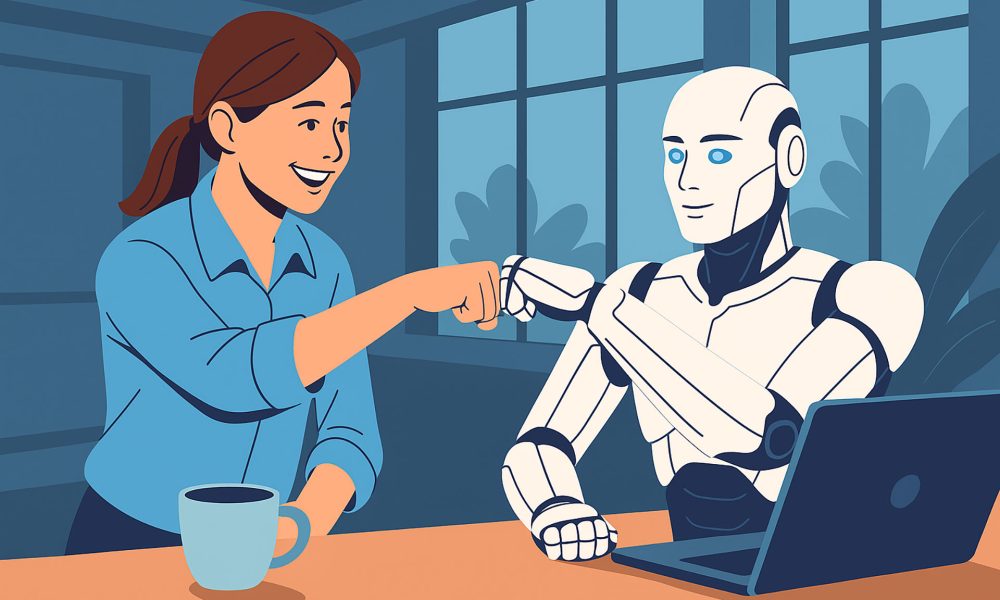Concerns about the future of work and AI are everywhere right now—especially online. In one TikTok skit, two people introduce themselves as “AI supervisors”—one for screenwriting, the other for teaching.
The punchline lands hard. In this imagined future, AI hasn’t fully replaced workers—but it’s taken over the most satisfying parts of their jobs. The thrill of finally landing the right line of dialogue, or seeing a child’s face light up with confidence after mastering a new concept.
What once seemed like a distant possibility is now a growing reality: AI and job displacement isn’t theoretical anymore—it’s already happening. And it’s forcing us to ask important questions about what it means to work – or even be human.
Understanding the Future of Work and AI
AI is being adopted at a faster pace than any previous technology—ChatGPT reached 1 billion monthly visits just four months after its launch. By comparison, it took nearly 20 years for home computers to become commonplace.
This rapid adoption is largely driven by promises of increased efficiency, reduced costs, and fast-tracked innovation. But unlike earlier tech shifts, the future of work and AI isn’t just about convenience—it’s about transformation. Generative AI is positioned to reshape not just how we work, but what kinds of work exist in the first place. According to recent research from the Brookings Institution, over 30% of U.S. workers could see at least half of their job responsibilities impacted by AI.
Along with concerns around AI and job displacement, workers are also navigating the pressure to meet inflated productivity standards driven by AI’s perceived capabilities. Many fear that without clear boundaries, the result will be burnout, alienation, and a further erosion of meaningful connection in the workplace.
While some industries—like the Writers Guild—have taken early steps to define how AI can and can’t be used, it’s clear that broader protections and ethical frameworks are needed to ensure AI supports, rather than replaces, human contributions. Industries like healthcare, finance, and education are already adapting, showing that the skills needed in the AI era go beyond technical expertise—they require flexibility, creativity, and emotional intelligence.

AI and Job Displacement: A Historical Perspective
As we celebrate International Workers’ Day this year, it’s worth reflecting on another era when technological advances generated immense wealth—but at great human cost: the Industrial Revolution.
Automation led to the rise of factories—along with the long hours and inhumane working conditions that often came with them. It also devalued the work of skilled craftsmen and artisans who had spent years honing their trades.
It took labor movements and unions to push back—fighting for safety standards, livable wages, and humane work expectations.
History makes one thing clear: without intentional protections, innovation tends to prioritize profit over people. As we navigate the future of work and AI, it’s important that we learn from the past—especially in light of growing concerns around AI and job displacement. What we choose to regulate—and protect—now will shape the future of how we work, collaborate, and live. While history reminds us of the risks, the future of jobs in AI includes new possibilities, from AI trainers to ethics officers, offering roles that blend technology with human insight.
Reskilling and Upskilling: Preparing for AI-Driven Changes
In an AI-driven world, reskilling and upskilling are essential strategies for staying relevant and competitive. As automation transforms industries, the skills needed in the AI era are evolving rapidly. According to the World Economic Forum, 44% of workers’ skills will be disrupted within five years, emphasizing the urgency for continuous learning.
Reskilling involves learning new skills to transition into different roles, while upskilling enhances current abilities to meet changing job requirements. For instance, a customer service representative might upskill by learning to manage AI-driven chatbots, whereas a manufacturing worker might reskill to operate advanced robotics. Emotional intelligence also plays a crucial role, as AI cannot replicate human empathy and interpersonal skills, making these attributes increasingly valuable in the future of jobs in AI.

Why Emotional Intelligence is Invaluable in the AI era
While AI can make predictions based on data and simulate tone, it can’t truly respond from its own emotional experiences. True leadership requires more than the ability to process numbers or predict trends—it requires creativity and collaboration that stems from empathy, nuance, and humanity.
This ability to draw from and apply past emotional experiences is emotional intelligence (EQ)—and it’s one of the most highly valued skills a leader can have, especially in an increasingly automated work environment shaped by the future of work and AI.
EQ isn’t just something you’re born with or you aren’t, however. It’s a skill – one that you can develop at any age. Part of being a leader is listening and empowering others to share their perspectives in a way that contributes to shared goals. Tools like Siddha’s “Helping Others Speak Up” meditation are designed to support this kind of mindful leadership, helping people build trust and create space for collaboration. For example, a project manager leading a hybrid AI-human team will need high emotional intelligence to balance data-driven decisions with empathy—making AI and emotional intelligence a crucial partnership for effective leadership.
You can also read “Meditation for Emotional Intelligence: Techniques to Improve Self-Awareness“
As AI and job displacement continue to impact traditional roles, the ability to lead with empathy becomes even more important—not just for team morale, but for resilience and adaptability in a changing world.

The Role of Mindful Leadership in the Age of AI
Who leads and how they lead matters more than ever. Today’s leaders will make decisions about how AI is used that can impact generations to come. Mindful leadership directly affects moral, trust, and retention –especially when AI and job displacement are looming concerns.
More than that, leadership isn’t just about executives anymore. With flat organizations and self-directed work becoming more common, leadership is about how you show up—as a manager, team member, or freelancer. The future of work and AI demands emotional intelligence from everyone, not just the C-suite.
That’s why, no matter what job you may be doing now or what goals you may have for your future, developing your mindful leadership style through courses like this one on the Siddha Meditate app is essential. Leaders who prioritize emotional intelligence, ethical judgment, and adaptability are building the very skills needed in the AI era to guide teams through complex change.
The Future Workplace: Collaboration Between Humans and AI
Mindful leadership isn’t just about guiding people—it’s about building systems where both humans and AI can thrive. As AI takes on more technical and repetitive tasks, the future of work and AI will increasingly depend on collaboration between human creativity and machine efficiency. Emotional intelligence will play a central role here, helping leaders foster trust, communication, and ethical decision-making in teams that work alongside AI.
For workers, this collaboration also highlights the skills needed in the AI era. Beyond technical knowledge, tomorrow’s professionals will need the ability to interpret AI insights, apply human judgment, and lead with empathy. It’s a future where emotional intelligence and adaptability aren’t optional—they’re essential for navigating the evolving workplace and shaping the future of jobs in AI.
Why Structural Change is Essential For the Future of Work and AI
It shouldn’t fall on the shoulders of individuals to adapt to the challenges created by an increasingly AI-driven world. To ensure the future of work and AI is one that centers human wellbeing, we need structural change—through policy, regulation, and ethical frameworks.
We need visionaries who see productivity as more than just numbers—who view it as a way to create long-term health for both organizations and their people. We need legislation that protects human creativity and expands beyond technical training alone. Without intentional protections, AI is set to deepen existing inequalities and accelerate job displacement across industries.
The responsibility doesn’t fall on workers to “adapt harder.” It falls on all of us to build systems that support adaptation in the first place. Policies addressing AI and job displacement—including worker protections, retraining programs, and ethical AI guidelines—are vital to ensure innovation doesn’t leave people behind.

Mindfulness and Meditation: Strengthening Emotional Intelligence in the AI Era
In the evolving landscape of the future of work and AI, cultivating emotional intelligence is more crucial than ever. Mindfulness and meditation practices have been shown to enhance self-awareness and empathy, key components of emotional intelligence. By regularly engaging in mindfulness, individuals can better navigate the complexities introduced by AI technologies in the workplace.
Siddha Meditate, a mental fitness app, offers personalized meditation challenges designed to build emotional resilience and clarity. Incorporating such tools into daily routines can help professionals develop the skills needed in the AI era, ensuring they remain adaptable and emotionally intelligent in the face of rapid technological advancements.
Building the Future of Jobs in AI
AI forces us to take a close look at how we think about work—and what we truly value about humanity. The Industrial Revolution saw workers treated more like machines than people. But if implemented with people-first policies, AI could push us to finally value all the ways we aren’t machines.
If we have the resilience and courage to advocate for human-centered systems, the future of work and AI could look radically different. We could enter a new era of leadership and organization—one that centers emotional intelligence, ethical innovation, and collective wellbeing.
This is why Siddha Meditate exists—to help develop leaders with the tools and emotional resilience to navigate the challenges of the future of work and AI. Developing emotional intelligence and adopting a mindful leadership style isn’t just about managing the implications of AI and job displacement—it’s an investment in a better future. One grounded in a deep understanding of what makes our humanity so precious.

If you’re ready to become the kind of leader tomorrow needs, join us. Our personalized challenges are designed to help you build a daily mental fitness practice that supports adaptability, emotional clarity, and long-term wellbeing in a rapidly changing world. And as we navigate this evolving landscape, practicing meditation for productivity can be a simple yet powerful way to stay focused, adaptable, and mentally strong through every challenge.
FAQs about Future of work and AI
1. What are the key skills needed in the AI era to stay relevant in the workforce?
In the AI era, essential skills include adaptability, emotional intelligence, and the ability to collaborate effectively with AI technologies. These competencies enable professionals to navigate the evolving landscape of the future of work and AI.
2. How does AI contribute to job displacement, and what can workers do to adapt?
AI and job displacement are interconnected, as automation can replace routine tasks, leading to changes in employment. To adapt, workers should focus on reskilling and upskilling, emphasizing skills needed in the AI era, such as critical thinking and emotional intelligence, to remain competitive in the future of jobs in AI.
3. Why is emotional intelligence important in an AI-driven workplace?
AI and emotional intelligence are complementary; while AI excels at processing data, it lacks the human touch. Emotional intelligence enables individuals to manage interpersonal relationships judiciously and empathetically, a crucial aspect in the future of work and AI where human-centric skills are invaluable.
4. How can mindfulness and meditation enhance productivity in the AI era?
Practicing mindfulness and meditation can bolster focus and emotional resilience, key components of emotional intelligence. Incorporating these practices supports mental fitness, aiding professionals in managing the demands of the future of work and AI.








2 Comments
Comments are closed.